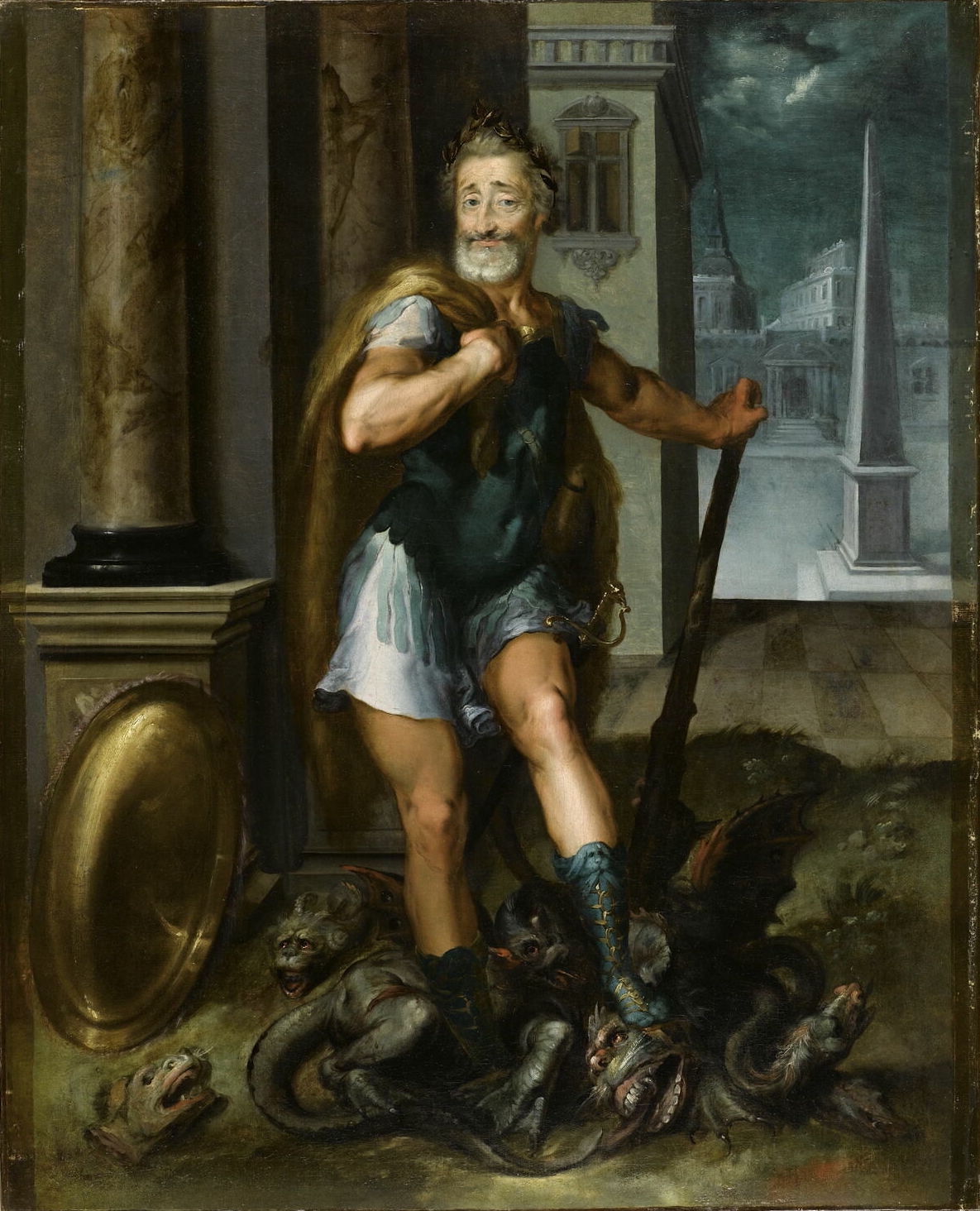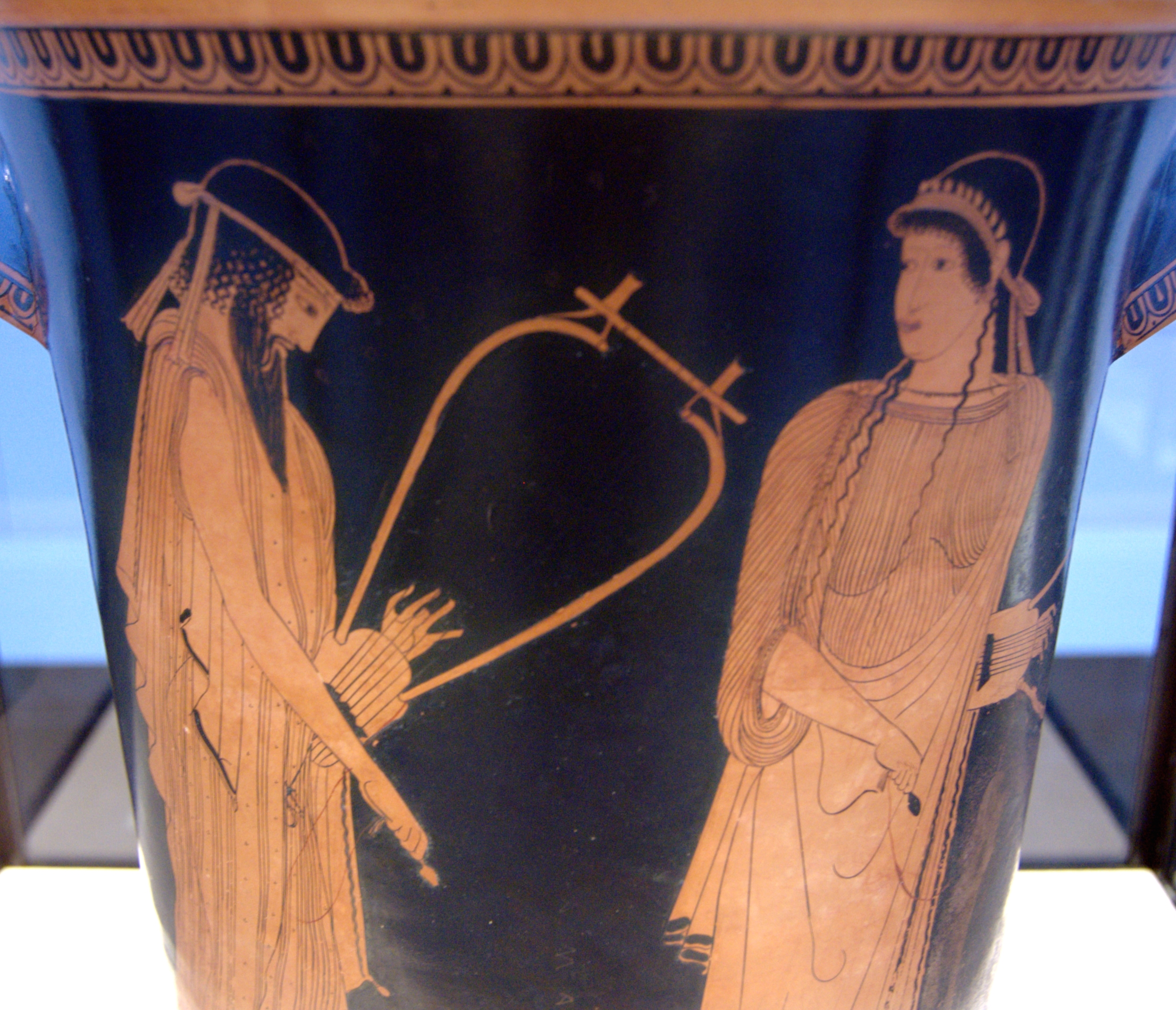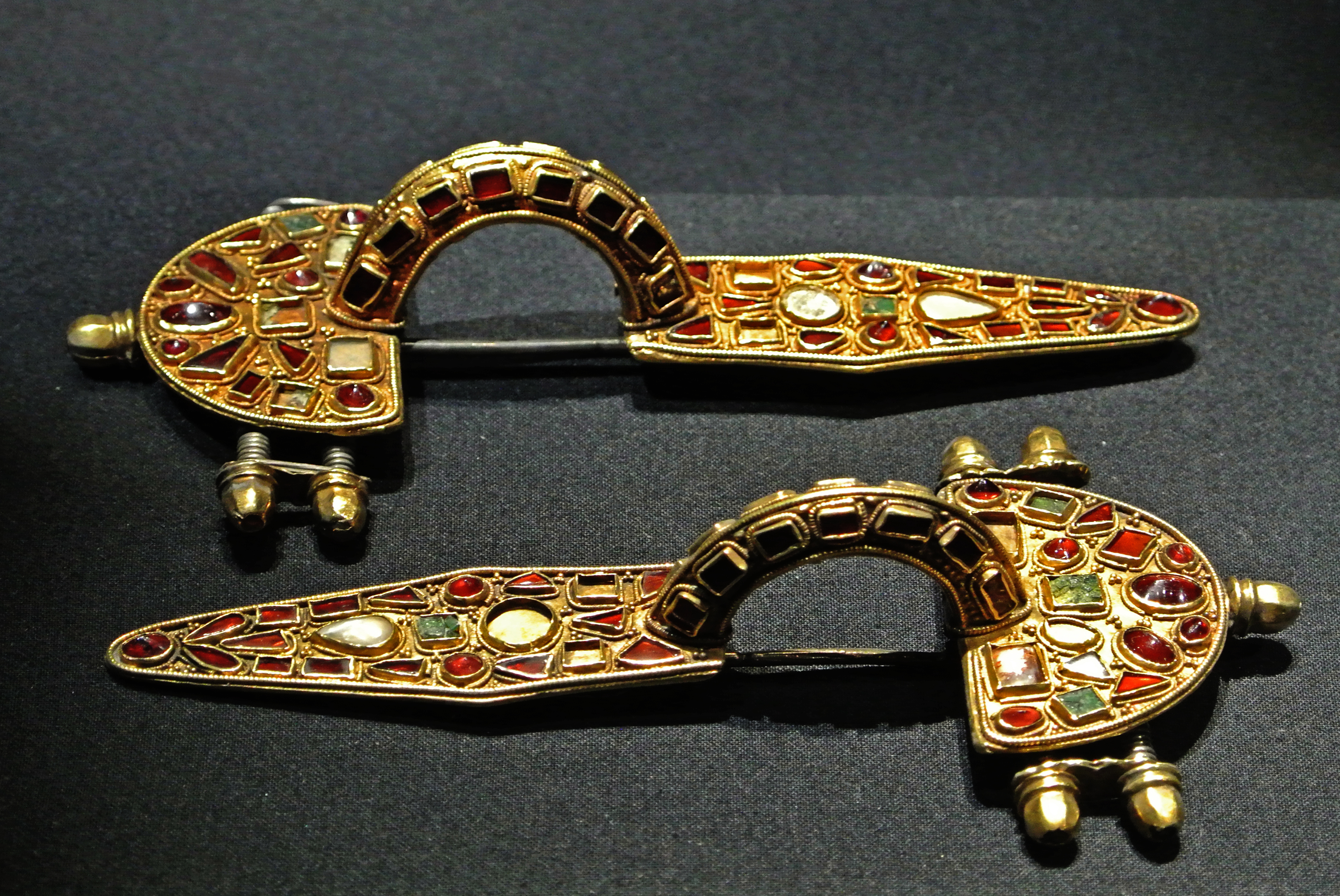|
Hydra (mythology)
The Lernaean Hydra or Hydra of Lerna ( grc-gre, Λερναῖα Ὕδρα, ''Lernaîa Hýdra''), more often known simply as the Hydra, is a serpentine water monster in Greek and Roman mythology. Its lair was the lake of Lerna in the Argolid, which was also the site of the myth of the Danaïdes. Lerna was reputed to be an entrance to the Underworld, and archaeology has established it as a sacred site older than Mycenaean Argos. In the canonical Hydra myth, the monster is killed by Heracles (Hercules) as the second of his Twelve Labors. According to Hesiod, the Hydra was the offspring of Typhon and Echidna. It had poisonous breath and blood so virulent that even its scent was deadly. The Hydra possessed many heads, the exact number of which varies according to the source. Later versions of the Hydra story add a regeneration feature to the monster: for every head chopped off, the Hydra would regrow two heads. Heracles required the assistance of his nephew Iolaus to cut off all of ... [...More Info...] [...Related Items...] OR: [Wikipedia] [Google] [Baidu] |
Gustave Moreau
Gustave Moreau (; 6 April 1826 – 18 April 1898) was a French artist and an important figure in the Symbolist movement. Jean Cassou called him "the Symbolist painter par excellence".Cassou, Jean. 1979. ''The Concise Encyclopedia of Symbolism.'' Chartwell Books, Inc., Secaucus, New Jersey, 292 pp. He was an influential forerunner of symbolism in the visual arts in the 1860s, and at the height of the symbolist movement in the 1890s, he was among the most significant painters. Art historian Robert Delevoy wrote that Moreau "brought symbolist polyvalence to its highest point in ''Jupiter and Semele''."Delevoy, Robert L. 1978. ''Symbolist and Symbolism.'' Editions D'Art Albert Skira, Geneva//Rizzoli International Publishing, Inc. New York. 247 pp. He was a prolific artist who produced over 15,000 paintings, watercolors, and drawings. Moreau painted allegories and traditional biblical and mythological subjects favored by the fine art academies. J. K. Huysmans wrote, "Gustave Moreau ... [...More Info...] [...Related Items...] OR: [Wikipedia] [Google] [Baidu] |
Hercules
Hercules (, ) is the Roman equivalent of the Greek divine hero Heracles, son of Jupiter and the mortal Alcmena. In classical mythology, Hercules is famous for his strength and for his numerous far-ranging adventures. The Romans adapted the Greek hero's iconography and myths for their literature and art under the name ''Hercules''. In later Western art and literature and in popular culture, ''Hercules'' is more commonly used than ''Heracles'' as the name of the hero. Hercules is a multifaceted figure with contradictory characteristics, which enabled later artists and writers to pick and choose how to represent him. This article provides an introduction to representations of Hercules in the later tradition. Mythology Birth and early life In Roman mythology, although Hercules was seen as the champion of the weak and a great protector, his personal problems started at birth. Juno sent two witches to prevent the birth, but they were tricked by one of Alcmene's servants and sent ... [...More Info...] [...Related Items...] OR: [Wikipedia] [Google] [Baidu] |
Heraclitus The Paradoxographer
Heraclitus Paradoxographus ( el, Ἡράκλειτος) is the author of the lesser-known of two works known as ''Peri Apiston'' (''On Unbelievable Tales''). Palaephatus was the author of a better-known work of paradoxography with the same title, mentioned more often in antiquity. Heraclitus' ''Peri Apiston'' treats Greek mythology in the rationalizing manner that appealed to Christian apologists, in pithy language and thought. The text survives in a single 13th-century manuscript in the Vatican Library; it has minor imperfections, and it may well be a late Byzantine epitome of a longer work. Nothing is known of the author, although he appears to belong to the late 1st or 2nd century AD. He is unlikely to be any of the other men of the name of Heraclitus known from antiquity. The 12th-century Byzantine scholar and commentator on Homer, Eustathius of Thessalonica, is the only scholar who mentions him, as "the Heraclitus who proposes to render unbelievable tales believable".Noted by J ... [...More Info...] [...Related Items...] OR: [Wikipedia] [Google] [Baidu] |
Virgil
Publius Vergilius Maro (; traditional dates 15 October 7021 September 19 BC), usually called Virgil or Vergil ( ) in English, was an ancient Roman poet of the Augustan period. He composed three of the most famous poems in Latin literature: the ''Eclogues'' (or ''Bucolics''), the ''Georgics'', and the epic ''Aeneid''. A number of minor poems, collected in the ''Appendix Vergiliana'', were attributed to him in ancient times, but modern scholars consider his authorship of these poems as dubious. Virgil's work has had wide and deep influence on Western literature, most notably Dante's ''Divine Comedy'', in which Virgil appears as the author's guide through Hell and Purgatory. Virgil has been traditionally ranked as one of Rome's greatest poets. His ''Aeneid'' is also considered a national epic of ancient Rome, a title held since composition. Life and works Birth and biographical tradition Virgil's biographical tradition is thought to depend on a lost biography by the Roman ... [...More Info...] [...Related Items...] OR: [Wikipedia] [Google] [Baidu] |
Euripides
Euripides (; grc, Εὐριπίδης, Eurīpídēs, ; ) was a tragedian Tragedy (from the grc-gre, τραγῳδία, ''tragōidia'', ''tragōidia'') is a genre of drama based on human suffering and, mainly, the terrible or sorrowful events that befall a main character. Traditionally, the intention of tragedy i ... of classical Athens. Along with Aeschylus and Sophocles, he is one of the three ancient Greek tragedians for whom any plays have survived in full. Some ancient scholars attributed ninety-five plays to him, but the ''Suda'' says it was ninety-two at most. Of these, eighteen or nineteen have survived more or less complete (''Rhesus (play), Rhesus'' is suspect). There are many fragments (some substantial) of most of his other plays. More of his plays have survived intact than those of Aeschylus and Sophocles together, partly because his popularity grew as theirs declinedMoses Hadas, ''Ten Plays by Euripides'', Bantam Classic (2006), Introduction, p. ixhe became, ... [...More Info...] [...Related Items...] OR: [Wikipedia] [Google] [Baidu] |
Simonides Of Ceos
Simonides of Ceos (; grc-gre, Σιμωνίδης ὁ Κεῖος; c. 556–468 BC) was a Greek lyric poet, born in Ioulis on Ceos. The scholars of Hellenistic Alexandria included him in the canonical list of the nine lyric poets esteemed by them as worthy of critical study. Included on this list were Bacchylides, his nephew, and Pindar, reputedly a bitter rival, both of whom benefited from his innovative approach to lyric poetry. Simonides, however, was more involved than either in the major events and with the personalities of their times. Lessing, writing in the Enlightenment era, referred to him as "the Greek Voltaire." His general renown owes much to traditional accounts of his colourful life, as one of the wisest of men; as a greedy miser; as an inventor of a system of mnemonics; and the inventor of some letters of the Greek alphabet (). Such accounts include fanciful elements, yet he had a real influence on the sophistic enlightenment of the Classical era. His fame ... [...More Info...] [...Related Items...] OR: [Wikipedia] [Google] [Baidu] |
Alcaeus Of Mytilene
Alcaeus of Mytilene (; grc, Ἀλκαῖος ὁ Μυτιληναῖος, ''Alkaios ho Mutilēnaios''; – BC) was a lyric poet from the Greek island of Lesbos who is credited with inventing the Alcaic stanza. He was included in the canonical list of nine lyric poets by the scholars of Hellenistic Alexandria. He was a contemporary of Sappho, with whom he may have exchanged poems. He was born into the aristocratic governing class of Mytilene, the main city of Lesbos, where he was involved in political disputes and feuds. Biography The broad outlines of the poet's life are well known. He was born into the aristocratic, warrior class that dominated Mytilene, the strongest city-state on the island of Lesbos and, by the end of the seventh century BC, the most influential of all the North Aegean Greek cities, with a strong navy and colonies securing its trade-routes in the Hellespont. The city had long been ruled by kings born to the Penthilid clan but, during the poet's life, the ... [...More Info...] [...Related Items...] OR: [Wikipedia] [Google] [Baidu] |
Fibula (brooch)
A fibula (/ˈfɪbjʊlə/, plural fibulae /ˈfɪbjʊli/) is a brooch or pin for fastening garments, typically at the right shoulder. The fibula developed in a variety of shapes, but all were based on the safety-pin principle. Unlike most modern brooches, fibulae were not only decorative; they originally served a practical function: to fasten clothing for both sexes, such as dresses and cloaks. In English, "fibula" is not a word used for modern jewellery, but by archaeologists, who also use "brooch", especially for types other than the ancient "safety pin" types, and for types from the British Isles. There are hundreds of different types of fibulae. They are usually divided into families that are based upon historical periods, geography, and/or cultures. Fibulae are also divided into classes that are based upon their general forms. Fibulae replaced straight pins that were used to fasten clothing in the Neolithic period and the Bronze Age. In turn, fibulae were replaced as clo ... [...More Info...] [...Related Items...] OR: [Wikipedia] [Google] [Baidu] |
Iolaus
In Greek mythology, Iolaus (; Ancient Greek: Ἰόλαος ''Iólaos'') was a Theban divine hero. He was famed for being Heracles' nephew and for helping with some of his Labors, and also for being one of the Argonauts. Family Iolaus was the son of Iphicles and Automedusa, daughter of King Alcathous of Megara. He married Megara, and through her became the father of a Leipephilene. Through this daughter, Iolaus was considered to have fathered the mythic and historic line of the kings of Corinth, ending with Telestes. Mythology Relationship with Heracles Iolaus often acted as Heracles' charioteer and companion. Plutarch, describing the Theban Sacred Band in his life of Pelopidas, said "It is a tradition likewise that Iolaus, who assisted Hercules in his labours and fought at his side, was beloved of him; and Aristotle observes that, even in his time, lovers plighted their faith at Iolaus's tomb." Adventures Iolaus provided essential help to Heracles in his battle ... [...More Info...] [...Related Items...] OR: [Wikipedia] [Google] [Baidu] |
Regeneration (biology)
In biology, regeneration is the process of renewal, restoration, and tissue growth that makes genomes, cells, organisms, and ecosystems resilient to natural fluctuations or events that cause disturbance or damage. Every species is capable of regeneration, from bacteria to humans. Regeneration can either be complete where the new tissue is the same as the lost tissue, or incomplete where after the necrotic tissue comes fibrosis. At its most elementary level, regeneration is mediated by the molecular processes of gene regulation and involves the cellular processes of cell proliferation, morphogenesis and cell differentiation. Regeneration in biology, however, mainly refers to the morphogenic processes that characterize the phenotypic plasticity of traits allowing multi-cellular organisms to repair and maintain the integrity of their physiological and morphological states. Above the genetic level, regeneration is fundamentally regulated by asexual cellular processes. Regeneration ... [...More Info...] [...Related Items...] OR: [Wikipedia] [Google] [Baidu] |
Polycephaly
Polycephaly is the condition of having more than one head. The term is derived from the Greek stems ''poly'' (Greek: "πολύ") meaning "many" and ''kephalē'' (Greek: "κεφαλή") meaning "head". A polycephalic organism may be thought of as one being with a supernumerary body part, or as two or more beings with a shared body. Two-headed animals (called bicephalic or dicephalic) and three-headed (tricephalic) animals are the only type of multi-headed creatures seen in the real world, and form by the same process as conjoined twins from monozygotic twin embryos. In humans, there are two forms of twinning that can lead to two heads being supported by a single torso. In dicephalus parapagus dipus, the two heads are side by side. In craniopagus parasiticus, the two heads are joined directly to each other, but only one head has a functional torso. Survival to adulthood is rare, but does occur in some forms of dicephalus parapagus dipus. There are many occurrences of multi-h ... [...More Info...] [...Related Items...] OR: [Wikipedia] [Google] [Baidu] |
Hyginus
Gaius Julius Hyginus (; 64 BC – AD 17) was a Latin author, a pupil of the scholar Alexander Polyhistor, and a freedman of Caesar Augustus. He was elected superintendent of the Palatine library by Augustus according to Suetonius' ''De Grammaticis'', 20. It is not clear whether Hyginus was a native of the Iberian Peninsula or of Alexandria. Suetonius remarks that Hyginus fell into great poverty in his old age and was supported by the historian Clodius Licinus. Hyginus was a voluminous author: his works included topographical and biographical treatises, commentaries on Helvius Cinna and the poems of Virgil, and disquisitions on agriculture and bee-keeping. All these are lost. Under the name of Hyginus there are extant what are probably two sets of school notes abbreviating his treatises on mythology; one is a collection of ''Fabulae'' ("stories"), the other a "Poetical Astronomy". ''Fabulae'' The ''Fabulae'' consists of some three hundred very brief and plainly, even crudely, to ... [...More Info...] [...Related Items...] OR: [Wikipedia] [Google] [Baidu] |









